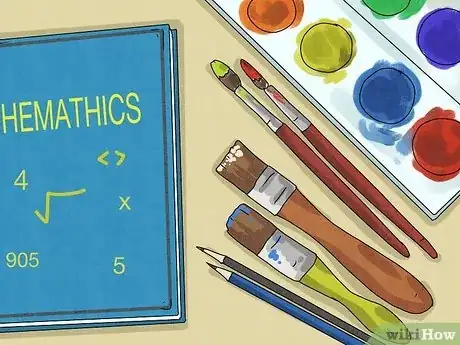This article was co-authored by Emily Listmann, MA. Emily Listmann is a private tutor in San Carlos, California. She has worked as a Social Studies Teacher, Curriculum Coordinator, and an SAT Prep Teacher. She received her MA in Education from the Stanford Graduate School of Education in 2014.
There are 12 references cited in this article, which can be found at the bottom of the page.
This article has been viewed 29,179 times.
In remedial college classes, you will review high school material. Approximately half of college students are required to take one such course before progressing to major subjects. Because taking these courses can make earning a degree slower and more expensive, you should try to test out of these classes in advance. If, however, you must take one, look at it as an opportunity to master an important skill.[1]
Steps
Changing Your Perspective on the Remedial Experience
-
1Look at the course as an opportunity. Many students are discouraged when they are assigned to a remedial class. Some assume this placement means they aren't ready for college. However, being assigned a remedial class doesn't mean that you are behind, just that you have an opportunity to receive better instruction and improve your skills in a subject that you have struggled with in the past.[2]
- There is nothing unusual about being asked to attend a remedial course: two thirds of community college students take at least one remedial course. At four-year colleges, approximately 40% of students take a remedial course.[3]
-
2Find ways to connect with the material. If you can see how the subject relates to the real world or to your personal experiences, it can make it more interesting. Aim to figure out how to make the material applicable to your own life.
- For instance, if you're taking an English class but want to become a marine biologist, you may not see how the class will help you in the long run. However, part of your job may include reading and writing reports, and strong English skills can help you accomplish these tasks.
Advertisement -
3Don't assume that you are naturally bad in the subject. The number one obstacle to being good at math is the belief that you just don't have the ability to succeed. Many people only develop a mastery of a subject later in life. Perhaps, you believed you were bad in the subject and therefore never tried hard enough. Perhaps, you just didn't have talented teachers.
- Once you convince yourself that there is nothing wrong with you, it'll be easier to commit to work hard enough to succeed.[4]
-
4Remember that it matters. While you might think that math doesn't matter if you want to be an artist, you would be wrong. If you are successful, at some point you will need to price your work and account for your sales. Your career can take you in unexpected directions and you should master all the skills that you can, because you never know which will be useful.[5]
-
5Ask for something harder. If the material is so familiar that it is becoming boring and hard to pay attention to, ask you professor if you can be assigned extra credit. Don't tell them that you find the course "boring" and don't give the impression that you are above the course. Just indicate that you want to learn more and ask if you can be given something more challenging.[6]
- If you go above and behind and establish a special relationship with a professor, they might be willing to help you out in the future when applying for jobs.
-
6Look to the future. There might be nothing you can do to really get interested in your remedial course. In that case, look ahead to what it means to finish up and pass the class. Remember that to move on to the major courses you want to take, you will need to finish your remedial course first. Think about where you want college to take you in life. Focus on that to muster the energy to get through this obstacle.[7]
Excelling in Class
-
1Get to know the professor. Most professors should hold office hours during which you can get to know them. This can be a good opportunity to build a relationship with the professor and learn about their expectations.
- If you establish a relationship with your professor, they might be willing to dedicate more time to advising you about how to be successful in the class and in college more generally.
- Ask about the requirements for the course. What sort of time should you expect to spend on assignments? How can you go above and beyond in the class? What qualities do they expect to see in an "A" level assignment? [8]
-
2Master good study habits. Ultimately, it is important to be able to develop a schedule to complete your work promptly. Make a point of finishing assignments in advance, rather than waiting until the last second. Organize your work, notes, and handouts so that you can find all relevant course materials.
-
3Finish assignments on time. Maybe in high school your teachers were lenient when you turned in an assignment late. Don't expect that to be true in college. You might not get any credit for a late assignment and sometimes in college a single assignment can make up a large chunk of your grade. Turning in any assignments late is flirting with failure.
-
4Do not fall behind. Sometimes you might be assigned readings that you won't be tested on immediately. Don't assume that you can wait until the final to learn everything you need to know. College classes require that you master much more information than high school classes. You might well find it difficult, if not impossible, to catch up if you fall behind.
- Course lectures and discussions often follow readings. If you haven't familiarized yourself with the text, the lecture might be unintelligible and you could have missed your one opportunity to understand the subject.
- Professors can also call on you in class for information. If you don't know the material they will probably subtract points from your participation grades.
-
5Write your notes by hand. Research has shown that writing notes by hand forces you to engage with and better remember the lecture than typing notes. Typing notes actually impairs the learning process by encouraging the note taker to mindlessly transcribe information without thinking about what is being said.[9]
- While it can be harder to get all of the information in the lecture while hand writing notes, notes are really less important as a point of future reference than they are as a way to actively engage with the lecturer as it happens. Because it is harder to keep up while handwriting notes, the note taker abbreviates the notes and is forced to decide what the most important points are.
- Computers also provide plenty of opportunities for distraction. In the study, however, note takers were not permitted to surf the internet or play games. That means that, even in the best case scenario, typing is a worse way to take notes than handwriting.
-
6Join a study group. Study groups can help you understand the material and prepare for exams and projects. However, they are also fun to be a part of! Speak to a few of your classmates to see if they'd be interested in joining a study group. You may want to set aside a few hours a week to review material and prepare for any upcoming assignments or tests with your study group.
- You can meet in a common area, like the library, or take turns hosting the group at member's homes. You could also take turns bringing snacks.
-
7Reach out for help. Colleges typically have much more extensive resources for students in need than were available to you in high school. There should be a tutoring center and possibly a writing center on campus. Other specialized resources might be available for harder classes. Ask your professor about what sort of assistance is available. Search the college website for more information.
- The professor should also be able to provide some help with problems during office hours, but her time will be limited. Come in with a specific question that you hope to have answered. If you simply announce that you need help, your professor will not know where to begin and might be reticent to help.
- When visiting the writing center, have an essay on hand. Someone should review the essay and not only correct mistakes, but also tell you more generally how to improve your writing.
- If no other options are available, talk to other students in the class about forming a study group to help each other.
- Remember, to improve you need to be willing to accept criticism. Your problem might not be that you can't handle the work, but that you are unwilling to adapt and use better methods. Find someone who is willing to talk honestly about what you need to do and take their comments to heart.
-
8Get involved in the campus community. To a greater degree than high school, college isn't just about going to class and taking tests. It's also about meeting people who might be important to your career and getting involved in organizations from which you can learn something. Ultimately, this experience important both in and out of classroom.
- While getting involved in a club might seem to distract you from classes, that doesn't need to be true. Being engaged in and enjoying the campus community can make you more invested in and dedicated to your collegiate success.[10]
-
9Get a good night's sleep. If you don't get sleep, you will have difficulty concentrating on class and school work. Research has also shown the missing sleep can severely impair your IQ. To be bright in the classroom, you need to make sure that you wake up bright and rested.[11]
-
10Eat a balanced breakfast. For energy that will keep you alert throughout the day try to have a hearty breakfast that includes protein like eggs, bacon, or yogurt. Whole grains, like granola or oatmeal can also help sustain you through the day. Don't forget, however, to also get some vitamins in by including fruit in your breakfast.[12]
Testing out of Remedial Classes
-
1Focus on learning in high school. Some colleges might look to your high school performance when deciding whether you need to take a remedial course. Others will require that you take special tests after you are accepted. In the latter case, you need to be sure that you not only did well in high school, but also retained what you learned.[13]
- To retain the math you learn in high school, don't focus on memorizing formulas. Instead, try to understand the logic behind the formulas. You might forget the formulas over time, but, if you understand how math works, you can figure out the process on your own.
-
2Take 4 years of math. Many high schools only require 3 years of math instruction. However, you are likely to forget much of your math knowledge if you go a full year without studying it. This will leave you unprepared for your placement exam.
-
3Study for placement exams. Most four year colleges use scores for the SAT, ACT, or Advanced Placement exams to determine whether or not you need remediation. Community colleges typically used specialized exams like ACCUPLACER or COMPASS. Despite some myths to the contrary, you can study for these exams in advance and improve your score.
- Before taking an exam, search online for it. Most exams have some practice tests available that you can take. This allows you to familiarize yourself with some of the concepts that will be tested in advance.
- There are also online courses that you can take to brush up on your math skills prior to an exam. Consider KhanAcademy or IXL.[14]
- ACCUPLACER is used by 62% of community colleges and COMPASS is used by 46%. Therefore, almost all community colleges use one of these two exams to determine if you need remedial courses.[15]
-
4Familiarize yourself with college requirements. When you know what colleges you are interested in applying to, search online to see what they require to skip remediation and plan your course and test schedule to meet these requirements. To make sure that nothing slips by, visit your high school counselor and ask if you are on track for college.
-
5Don't take your senior year off. Many students assume that their senior year is not vital to their success, because they have already passed all the hurdles necessary to get into college. Actually, much of what you do in your senior year will be important to how you are placed once entering into college. Stay on task and see if you can get ahead for college.
- If possible, take a class at a local community college during your senior year to familiarize yourself with college expectations.[16]
-
6Discuss placement with a counselor. If you have been placed in a remedial class and believe it is unnecessary, talk to a counselor at the college about why you received this placement. In some cases, they might be able to help you get out of the course.
- Usually, if you retake and pass the placement exam, you can get out of the remedial course. However, not all of these tests are offered regularly and you might have a limited amount of time to retake the test between your placement and when you begin class.
References
- ↑ http://www.wsj.com/articles/remedial-courses-in-college-stir-questions-over-cost-effectiveness-1416243572
- ↑ http://www.communitycollegesuccess.com/2014/04/5-things-to-do-to-be-successful-in.html
- ↑ http://www.usnews.com/education/community-colleges/articles/2015/07/14/plan-ahead-to-avoid-remedial-math-classes-in-community-college
- ↑ http://www.niemanlab.org/2013/11/matt-waite-how-i-faced-my-fears-and-learned-to-be-good-at-math/
- ↑ http://www.niemanlab.org/2013/11/matt-waite-how-i-faced-my-fears-and-learned-to-be-good-at-math/
- ↑ https://www.noodle.com/articles/what-to-do-when-your-kid-is-ahead-of-the-classroom
- ↑ http://www.communitycollegesuccess.com/2014/04/5-things-to-do-to-be-successful-in.html
- ↑ http://www.communitycollegesuccess.com/2014/04/5-things-to-do-to-be-successful-in.html
- ↑ http://www.medicaldaily.com/why-using-pen-and-paper-not-laptops-boosts-memory-writing-notes-helps-recall-concepts-ability-268770
- ↑ http://www.communitycollegesuccess.com/2014/04/5-things-to-do-to-be-successful-in.html
- ↑ http://time.com/3841225/can-missing-an-hour-of-sleep-take-points-off/
- ↑ http://www.health.com/health/gallery/0,,20683067_5,00.html
- ↑ http://www.usnews.com/education/community-colleges/articles/2015/07/14/plan-ahead-to-avoid-remedial-math-classes-in-community-college
- ↑ http://www.usnews.com/education/community-colleges/articles/2015/07/14/plan-ahead-to-avoid-remedial-math-classes-in-community-college
- ↑ http://www.washingtonmonthly.com/magazine/septemberoctober_2011/features/how_the_other_half_tests031638.php?page=all
- ↑ https://www.collegeparentcentral.com/2015/01/how-to-help-your-college-student-avoid-remedial-courses/



















































































